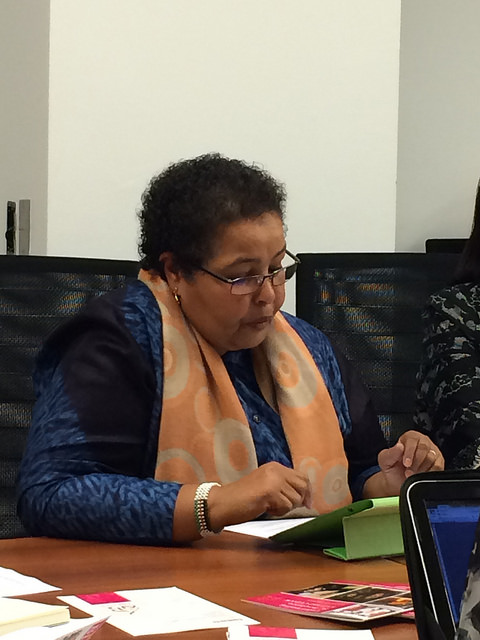Arab Women Leaders Call for Global Action for Peace and Security
 New York, NY (September 8, 2014) – Just days before the 69th General Assembly commences, Arab women leaders convened high-level policy makers in New York to issue key recommendations on women, peace, and security and call upon the international community for their urgent support in ensuring women’s participation at all levels of the peace and transition processes, and women’s protection and security in conflict and post-conflict situations.
New York, NY (September 8, 2014) – Just days before the 69th General Assembly commences, Arab women leaders convened high-level policy makers in New York to issue key recommendations on women, peace, and security and call upon the international community for their urgent support in ensuring women’s participation at all levels of the peace and transition processes, and women’s protection and security in conflict and post-conflict situations.
Responding to the marginalization, discrimination, and brutal violence committed against women both during and post-conflict, the briefing event, titled “Women’s Action for Peace,” was hosted by regional women’s rights organization Karama, in partnership with the Post 2015 Women’s Coalition, a global coalition focused on feminist movement building. The event provided international stakeholders with first-person accounts of the realities for women, and for their families and communities on the ground, as a means to foster effective dialogue and develop lasting solutions.
“There is a major disconnect between governments and communities,” said Karama founder Hibaaq Osman. “Governments must listen to the voices on the ground and their actions must reflect the realities of the people to create long-term peace and foster sustainable progress.”
 Since the Arab Uprisings, a more severe normative climate has emerged in the region, fueled largely by growing extremist influence. Recently, women have faced increasing and targeted violence and discrimination, including attacks on women human rights defenders. Arab women leaders gathered in New York demanded justice for these crimes, urging the international community to demonstrate a policy of no-tolerance for such heinous acts.
Since the Arab Uprisings, a more severe normative climate has emerged in the region, fueled largely by growing extremist influence. Recently, women have faced increasing and targeted violence and discrimination, including attacks on women human rights defenders. Arab women leaders gathered in New York demanded justice for these crimes, urging the international community to demonstrate a policy of no-tolerance for such heinous acts.
“Women human rights defenders are under threat in Libya,” said co-founder of the Libyan Women’s Platform for Peace, Zahra’ Langhi. “The assassination of Salwa Bugaighis and others should be prosecuted and justice should be addressed.”
Women are also facing systematic exclusion from peace and transition processes, and post-transition decision-making structures. At this time more than ever, women need to see active models who are engaged in supporting and protecting them, from more police women on the ground to more women decision-makers lobbying for reform of discriminatory laws.
Dr. Mouna Ghanem, co-founder of the Syrian Women’s Forum for Peace, spearheaded advocacy for women’s inclusion at the Geneva II Peace talks earlier this year. “Syria should learn from the experience of the Geneva talks and have women participate at the local levels politically,” she said. It is not just important to include women at the decision-making tables, but they have to be women who have influence in the local communities.
This sentiment is echoed from activists throughout the region, who believe that without women’s inclusion and influence, peace is not a real possibility. “In Somalia, women's active participation and trust-building is needed,” said the Director of Equality Now’s Nairobi office, Faiza Mohamed.
Many local and regional organizations have long been working on awareness-building and capacity-building initiatives to support women’s participation and inclusion. “Civil society organizations in Palestine are working on raising women’s awareness at the grassroots level to make them more aware of their rights with respect to human rights conventions, including UNSCR 1325, and to empower their role in the advocacy efforts on the national level and international level,” said Lamis Hantouli, Director of the Participation Enhancement Program at MIFTAH.
But in order to see real change in the region, the Arab women leaders stressed that the UN and international governments must re-envision how conflict is dealt with. They said the international community must break its pattern of dealing only with armed troops in negotiating peace and focus on demilitarization, disarmament, and dialogue. “Stakeholders only deal with women on domestic issues. For important issues, even the US Ambassador, for instance, who is a woman, is calling on men with guns,” said Langhi.
Moreover, the UN and international community must show more accountability and solidarity in addressing crimes against humanity, such as the genocides going on in Syria and Palestine. “They must support civil society and address key articles in UN SCR 1325, such as Article 11 which calls for and end to impunity for crimes against humanity and war crimes,” said Hantouli.
Karama’s delegation represents eight countries including Egypt, Libya, Palestine, Morocco, Somalia, and Syria.
For more information, please contact Avni Shah at avni@el-karama.org.
*
Karama is the Arabic word for ‘dignity’ and a growing movement working to stop violence against women in all its forms. In the wake of region-wide revolution, Karama continues to emphasize women’s political participation and involvement in decision-making and peacemaking, as well as women’s security and protection. For more about
The Post 2015 Women’s Coalition is made up of feminist, women’s rights, women’s development, grassroots, peace and social justice organizations, networks and individuals. It focuses on feminist movement building within and beyond the framework of the evolving post 2015 development processes to ensure that identified and articulated multi‐sectoral priorities related to gender equality, women's rights and women's empowerment are influencing and framing discussions and debates at all levels.
